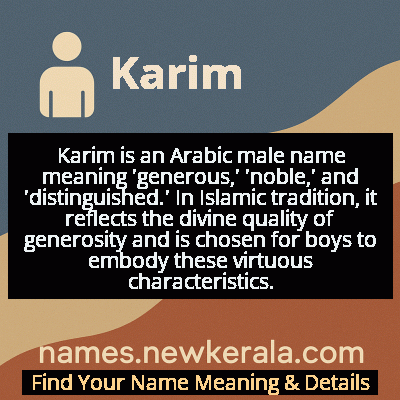Karim Name Meaning & Details
Origin, Popularity, Numerology Analysis & Name Meaning of Karim
Discover the origin, meaning, and cultural significance of the name KARIM. Delve into its historical roots and explore the lasting impact it has had on communities and traditions.
Name
Karim
Gender
Male
Origin
Muslim
Lucky Number
7
Meaning of the Name - Karim
Karim is an Arabic male name meaning 'generous,' 'noble,' and 'distinguished.' In Islamic tradition, it reflects the divine quality of generosity and is chosen for boys to embody these virtuous characteristics.
Karim - Complete Numerology Analysis
Your Numerology Number
Based on Pythagorean Numerology System
Ruling Planet
Neptune (Ketu)
Positive Nature
Intuitive, analytical, spiritual, and inquisitive.
Negative Traits
Secretive, reserved, aloof, and can be overly critical.
Lucky Colours
Green, yellow.
Lucky Days
Monday.
Lucky Stones
Cat’s eye, moonstone.
Harmony Numbers
1, 5, 6.
Best Suited Professions
Scientists, researchers, spiritual leaders, detectives.
What People Like About You
Depth of knowledge, analytical skills, spirituality.
Famous People Named Karim
Karim Benzema
Professional Footballer
Ballon d'Or winner and Real Madrid legend
Karim Rashid
Industrial Designer
Internationally renowned designer with over 3000 designs in production
Karim Khan Zand
Ruler/Founder
Founder of the Zand Dynasty in Persia
Karim Aïnouz
Film Director
Award-winning Brazilian film director and screenwriter
Name Variations & International Equivalents
Click on blue names to explore their detailed meanings. Gray names with will be available soon.
Cultural & Historical Significance
In many Muslim societies, naming a child Karim expresses the parents' hope that their son will embody these cherished Islamic values and contribute positively to their community. The name carries historical weight through figures like Karim Khan Zand, who founded the Zand Dynasty in 18th-century Persia and was remembered for his relatively benevolent rule. This cultural heritage makes Karim more than just a name—it represents an aspiration toward ethical leadership and community service that transcends geographical and temporal boundaries within the Muslim world.
Extended Personality Analysis
Individuals named Karim are often perceived as naturally generous and compassionate, with a strong sense of social responsibility. They tend to be warm, approachable, and genuinely interested in the well-being of others, making them excellent friends and community members. Their nobility of character manifests as integrity, honesty, and a commitment to ethical principles in both personal and professional contexts. These traits often make them trusted confidants and reliable partners in both personal and professional relationships.
Karims typically possess diplomatic skills and emotional intelligence that allow them to navigate complex social situations with grace. They often demonstrate leadership qualities through service rather than authority, earning respect through their consistent demonstration of core values and their willingness to support others without expectation of reward. While they can be ambitious, their ambition is usually tempered by their concern for collective well-being. The name's association with preciousness and distinction often translates into individuals who value quality in relationships and endeavors, seeking to make meaningful contributions rather than superficial achievements.
Modern Usage & Popularity
Karim remains a popular name across the Muslim world and in diaspora communities, maintaining consistent usage due to its strong religious and cultural significance. While it has never reached the explosive popularity of some contemporary names, it enjoys steady preference among parents seeking traditional Islamic names with positive meanings. In Western countries, the name has gained recognition through prominent figures like Karim Benzema, making it more familiar to non-Muslim populations. The spelling variations 'Kareem' and 'Karim' are both widely used, with the former being more common in English-speaking contexts. The name continues to be chosen by parents who value its deep cultural roots and the virtuous qualities it represents, ensuring its continued relevance in an increasingly globalized world.
Symbolic & Spiritual Meanings
Symbolically, Karim represents the ideal of boundless generosity and moral excellence. It embodies the concept that true nobility comes not from birth or status, but from character and actions. The name carries the metaphorical weight of an open hand, symbolizing both the giving of material resources and the offering of kindness, wisdom, and support. In spiritual contexts, it connects the bearer to the divine attribute of ultimate generosity, suggesting that human generosity reflects divine nature. The name also symbolizes preciousness and distinction - not in terms of elitism, but in the unique value each person brings to their community through their character and contributions. This symbolic richness makes Karim a name that carries deep philosophical and ethical implications beyond its literal meaning.

